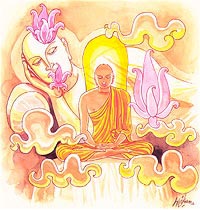10 03 2012 LESSON 546 FREE ONLINE eNālāndā Research And Practice UNIVERSITY And BUDDHIST GOOD NEWS LETTER Through http://sarvajan.ambedkar.org The Dhammapada Verses and
Stories Dhammapada Verses 96 Kosambivasitissattherasamanera Vatthu The
Tranquillity Of The Saints
THE BUDDHIST ON LINE GOOD
NEWS LETTER
COURSE PROGRAM
LESSONS 546
Practice a Sutta a Day
Keeps Dukkha Away
http://www.buddhanet.net/dhammapada/index.htm

Verse 96. The Tranquillity Of The Saints
Peaceful his mind and peaceful
his speech and actions too,
perfect in knowledge of freedom,
One Thus is of utmost peace.
Explanation: A noble arahat, who is freed by
‘disknowing’, or freedom from knowing, is calm and unshaken by the impact of
changing circumstances. His mind is at peace. His words are peaceful. His
actions are peaceful.
http://www.tipitaka.net/tipitaka/dhp/
Dhammapada Verse 96
Kosambivasitissattherasamanera Vatthu
Santam tassa manam hoti
santa vaca ca kamma ca
sammadanna vimuttassa
upasantassa tadino.
Verse 96: An arahat is calm in his mind, calm
in his speech, and also in his deed; truly knowing the Dhamma, such an arahat
is free from moral defilements and is unpurturbed by the ups and downs of life.
The Story of a Samanera from Kosambi
While residing at the Jetavana monastery, the
Buddha uttered Verse (96) of this book, with reference to a samanera, a pupil
of Thera Tissa from Kosambi.
Once, a seven year old boy was made a samanera
at the request of his father. Before his head was shaved the boy was given a
subject of meditation. While he was being shaved, the boy had his mind fixed
steadfastly on the object of meditation; as a result, he attained arahatship as
soon as they finished shaving his head.
After some time, Thera Tissa, accompanied by
the samanera, set out for Savatthi to pay homage to the Buddha. On the way,
they spent one night in a village monastery. The thera fell asleep, but the
young samanera sat up the whole night beside the bed of the old thera. Early in
the morning, the old thera thought it was time to wake up the young samanera.
So he roused up the samanera with a palm-leaf fan, and accidentally hit the eye
of the samanera with the handle of the fan and damaged the eye. The samanera
covered that eye with one hand and went about doing his duties of getting water
for the thera to wash his face and clean his mouth, sweeping the floor of the
monastery, etc. When the young samanera offered water with one hand to the
thera, the thera chided him, and said that he should offer things with both
hands. Only then, did the thera learn how the samanera lost his eye. At that
instant, he realized that he had wronged a truly noble person. Feeling very
sorry and humiliated, he made an apology to the samanera. But the samanera said
that it was not the fault of the thera, nor his own fault, but that it was only
the result of kamma, and so the thera was not to feel sad about it. But the
thera could not get over the unfortunate incident.
Then they continued their journey to Savatthi
and arrived at the Jetavana monastery where the Buddha was in residence. The
thera then told the Buddha that the young samanera who came along with him was
the most noble person he had ever met, and related all that had happened on
their way. The Buddha listened to him, and replied, “My son, an arahat
does not get angry with anyone he is restrained in his senses and is perfectly
calm and serene.”
Then the Buddha spoke in verse as follows:
|
Verse 96: An arahat is calm in his mind, calm in his speech, |